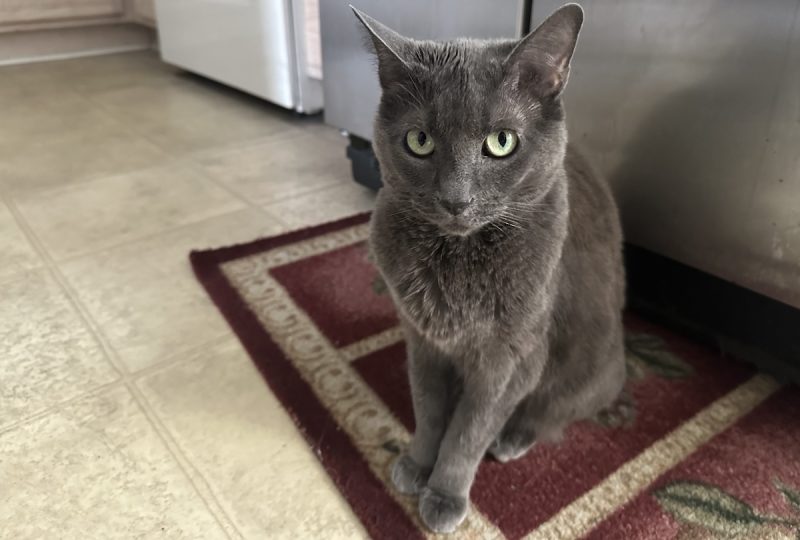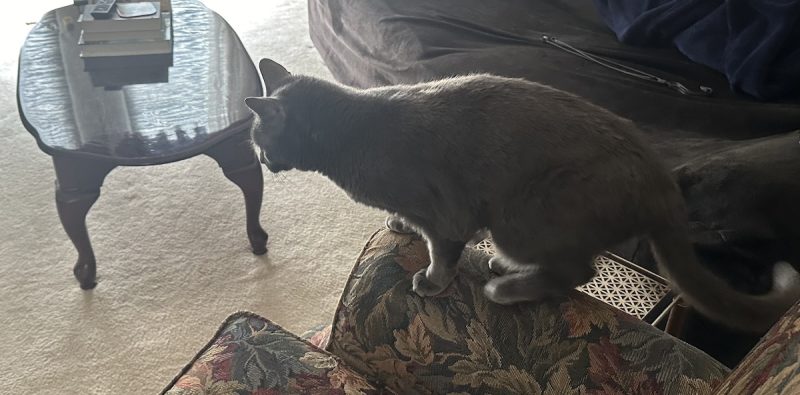The post Antifreeze Poisoning in Cats: Keeping Olga Safe From Toxic Chemicals by Christopher Bays appeared first on Catster. Copying over entire articles infringes on copyright laws. You may not be aware of it, but all of these articles were assigned, contracted and paid for, so they aren't considered public domain. However, we appreciate that you like the article and would love it if you continued sharing just the first paragraph of an article, then linking out to the rest of the piece on Catster.com.
Hi, I’m Christopher! Read my introduction to learn more about me and my silly Russian Blue cat, Olga.
Antifreeze and other chemicals containing ethylene glycol, such as hydraulic fluid, de-icing products, motor oil, paints, solvents, and wood stains, are toxic to cats and other animals. A small spoonful of antifreeze can kill a cat, and most felines don’t survive unless they’re treated within 6 hours.
Antifreeze Poisoning
The initial signs of antifreeze poisoning include vomiting, lethargy, incoordination, excessive urination, hypothermia, excessive thirst, and seizures. Unfortunately, the cat’s condition seems to improve after 12 hours, which can cause an owner to think they have recovered.
They can become dehydrated and breathe faster, but kidney damage, comas, and death are more likely after 12 hours.
Keeping Olga Safe
I don’t let Olga outside or allow her to explore my garage, where most of my toxic chemicals are stored, so she is less likely to be exposed to ethylene glycol than an outdoor cat. However, I’m always careful about where I store household cleaners and other hazardous products.
Olga can open doors and cabinets, and I don’t keep anything toxic in the bathrooms since she likes to open the cabinets occasionally. Although cats dislike sweet food, they’re attracted to antifreeze’s aroma.
They can get sick from licking their paws after walking through an antifreeze spill in the garage or sipping from a container with ethylene glycol. It’s difficult to understand why someone would intentionally poison a cat, but it happens more often than you think.

Punishing a Cat Murderer
Several years ago, I was visiting a friend when I heard people screaming outside. When we went outside to investigate, we learned that one of the neighbors had left a tray of antifreeze outside to kill a stray cat.
Some of the apartment’s residents had become attached to the cat and frequently fed him, and they wanted to murder, or at least mortally wound, the man who had killed him. They pounded on the murderer’s door and yelled, but he was either in class or hiding inside.
He was never injured or killed by the angry mob, but one of the cat lovers contacted the local university’s editor-in-chief. The cat killer was a journalist until he murdered the cat, and I’m glad the editor decided that unethical employees don’t make the best writers. I understand that stray cats annoy people and kill wildlife, but several humane deterrents can keep them away.

Animal Cruelty Laws
In the United States, killing a cat is a felony and can result in fines of up to $5,000 or 2 years in prison. Each state imposes different penalties, but some legislatures are trying to establish an animal cruelty registry that is modeled after sex offender lists.
Increasing the fines and prison terms for offenders may decrease the number of antifreeze deaths, but they won’t convince me to allow Olga to explore the outdoors. I’m paranoid enough about dropping a chunk of onion or garlic on the floor when I’m making dinner, and I don’t want to worry about another person injuring or killing my cat.
Keeping your cat indoors may seem selfish since they cannot explore the environment and hunt small animals, but it protects them from poisons, parasites, automobiles, and cruel humans.
The post Antifreeze Poisoning in Cats: Keeping Olga Safe From Toxic Chemicals by Christopher Bays appeared first on Catster. Copying over entire articles infringes on copyright laws. You may not be aware of it, but all of these articles were assigned, contracted and paid for, so they aren't considered public domain. However, we appreciate that you like the article and would love it if you continued sharing just the first paragraph of an article, then linking out to the rest of the piece on Catster.com.
from Catster https://ift.tt/UoRqTxG
